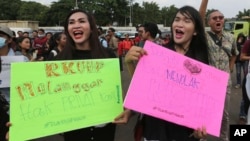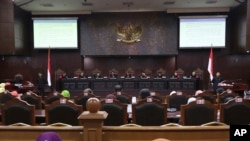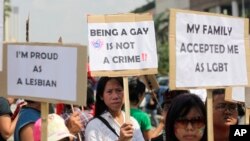Hundreds of activists protested outside Indonesia’s House of Representatives building on Monday against proposed revisions to the nation’s criminal code, which could outlaw gay and extramarital sex.
The so-called Civil Society Alliance to Reject the Draft Criminal Code activists included feminists, LGBTQ people, sex workers, indigenous people, labor union members, and more.
Speaking at the protest, queer activist Lini Zurlia said it was the first in a series of protests against the revisions; the next one is planned for Wednesday.
“We're calling on fellow Indonesians to join the next protest,” Zurlia said.
Intersectional alliance
Although the most sensational part of the revisions has been the criminalization of various forms of sex (grouped together under the Islamic concept of zina, or unlawful sexual intercourse), the sweeping nature of the proposals also affect less-obvious groups. It is possible that distributing means of, or even information on, contraception will become illegal for “unlicensed” individuals, which includes most nonprofits.
“Zina laws already criminalize sex workers. If we can’t distribute things like condoms, it could create major public health issues.” said Wawan of OPSI, a national sex workers' alliance.
Indigenous people could also be affected because they frequently engage in adat, or customary law marriages that are not recognized by the state. Many of them could be considered criminals under the new code for technically having “extramarital” sex. Several members of Indonesia’s Alliance of Indigenous People of the Archipelago, or AMAN, attended the protest.
The most severe anti-LGBT language appears to have been expunged from the latest draft of the code, which explicitly criminalizes only same-sex relations with minors under 18. But there remained a sense that it’s not over until it’s over.
“It's plain to see that the revised criminal code purely stemmed out of political interest, as is the case with Indonesia's current sociopolitical going-ons,” said Fajar Zakhri, a 26-year-old gay man who attended the protest today. “Therefore, I felt the importance of being present in assisting the fight and making sure that, once and for all, justice for everyone is served. In a young democracy such as Indonesia, this is an incessant fight that will not quit until the obsolete generations are no longer hogging the Indonesian life.”
“I think this is a slippery slope,” said Amar, an activist with the Indonesian Drug Users Network (PKNI). “It’s simply not humanist. It doesn’t affect our agenda directly, but I think actions like this will happen more often if we don’t take a stand now.”
There were about 200 protesters outside Parliament, an impressive showing across sectors, especially since it was planned with just a few days notice. But it was notably smaller than recent civic actions by Islamists in Jakarta, who have attracted thousands of protesters in the past year for causes ranging from arraigning the previous governor for a blasphemy charge to “resisting the revival of the Indonesian Communist Party.”
Delayed decision
Activists originally expected the revisions to be announced Wednesday, Valentine’s Day. But the decision has seemingly been postponed until March, according to several women who helped organize a Change.org petition to protest the revisions.
Every major political party has backed some form of the criminalizations under review, which is regarded as a coup for political Islam in the world’s largest Muslim-majority country.
Ichsan Soelistio, a legislator from Indonesia’s ruling PDIP told the Washington Post this week that while his party rejects “full criminalization,” they have still agreed to allow prosecuting gay and extramarital sex “but only if one of the sexual partners or their family members report the crime to police.”
Last week, the chairman of the team leading the revision process said that the moral policing aspect of the revisions had been mitigated, because whereas any third party could once report zina, it had been changed to immediate relatives — husbands, wives, parents, and children.
Meanwhile, “contempt of the president” is still on track to be an imprisonable offense.






